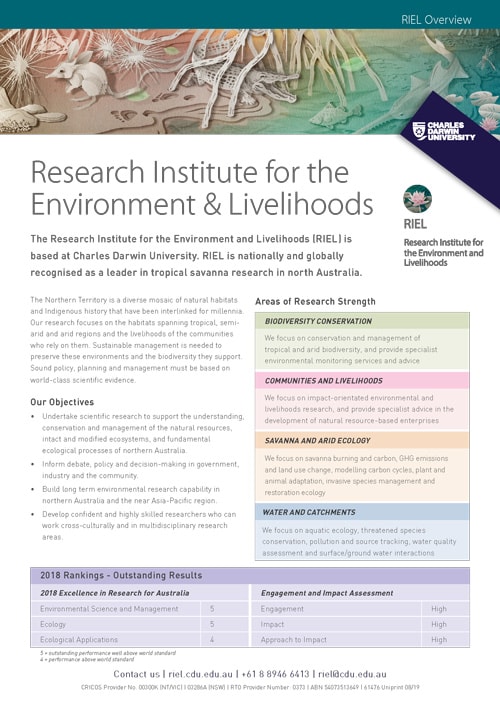This month we visit Charles Darwin University and feature outstanding research leader on tropical savannas, their habitats and the livelihoods of the communities relying on their sustainability.
RIEL’s research strengths include bioacoustics research conservation, savanna and arid ecology, water and catchments, and communities and livelihoods, explains institute co-director Professor Jenny Davis, who’s also a member of TERN’s Science Advisory Committee.
“The Northern Territory is a diverse mosaic of natural habitats and Indigenous history that have been interlinked for millennia.
Our research focuses on the habitats spanning tropical, semi- arid and arid regions and the livelihoods of the communities that rely on them.”
Jenny says that close collaborations with a diverse range of partners in northern Australia ensures that RIEL’s research has tangible outcomes and is contributing to the sustainable management of Australia’s tropical ecosystems and their resources.

“Sustainable management is needed to preserve these environments and the biodiversity they support. Sound policy, planning and management must be based on world-class scientific evidence.
For example, RIEL and its research is strengthening the region’s capabilities in water resource management; providing better understanding of the sources and movements of chemicals and microbes in the environment; assessing environmental water requirements for aquatic ecosystems and sustainable fisheries management; and building natural resource management capacity within Indigenous communities, in Australia, Timor–Leste and Eastern Indonesia.
Importantly, we’re also developing the world’s first savanna burning carbon industry in Northern Australia, which is very successful environmentally, economically and culturally.”
Savanna burning carbon farming initiatives are based on Indigenous landholders intentionally burning grasslands early in the dry season to reduce fuel loads which, in turn, reduces the severity of late-season fires and results in fewer carbon emissions. It is estimated that just one project, the Carbon Farming Initiative, is generating up to 20,000 Australian carbon credit units each year. Another project, the West Arnhem Land Fire Abatement project, has abated over 2 million tonnes of CO2 since 2006—equivalent to around 240,000 homes’ electricity use for a year—and provided around 300 Indigenous jobs each year.

Unique student learning experiences and international collaborations
Beyond research, RIEL also supports undergraduate learning and postgraduate training through the provision of intensive field units. Professor Lindsay Hutley, convenor of Ecosystem Function: Field Studies in North Australia, and his colleagues take students to a selection of research sites along TERN’s North Australian Tropical Transect—part of a global network of sub continental-scale transects that traverse the world’s major biomes, under the auspices of the United Nation’s International Geosphere-Biosphere Program.
“We visit research sites at Mataranka, Daly River and Litchfield National Park, and investigate the interactions between biomass productivity, rainfall and fire. Each site has different fire histories, from unburnt in 30 years to multiple fires every year, and varying rainfall and biomass accumulation levels so it’s the perfect suite of research infrastructure for the students.
We finish the trip at the TERN Litchfield Savanna SuperSite, which is ideal for explaining the importance of fire regime, stand structure and productivity.
This year [2019] we had students from Nepal, India, Ghana, Norway, Batchelor, Rum Jungle, Humpty Doo, Darwin, Newcastle, Melbourne and Brazil, so it was not just an amazing learning experience, but also a unique chance for international scientific and cultural exchange.”
@CDUni environmental science students at the @TERN_Aus Litchfield Savanna Supersite looking at fire, rainfall and savanna. Students from Nepal, India, Ghana, Norway, Batchelor, Rum Jungle, Humpty Doo, Darwin, Newcastle, Melbourne and Brazil. pic.twitter.com/W12xY0AyHC
— Lindsay Hutley (@HutleyLindsay) July 13, 2019






